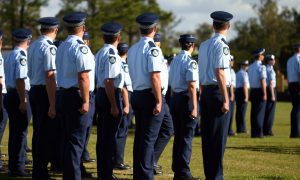***IMPORTANT***The Information below may have changed. please visit FWPD recruiting page for verification of information
FORT WORTH POLICE HIRING PROCESS
After meeting all preliminary requirements, every applicant is required to complete the following procedures:
BASIC REQUIREMENTS
- Education – High school diploma or GED and 12 semester hours of college.Residency – Must live within 30 minutes of designated report-in station; must be accomplished within six (6) months of employment.
- Age Requirements – 21 to 35 years of age. (Cannot have reached 36th birthday by date of certification.) or up to 44 with 5 years previous experience as a peace officer or military.
- Licenses – Valid and current Class “C” Driver’s License.
- Veteran – Must have received an Honorable Discharge to qualify for veteran points on passing score of 70. Please submit photocopy of DD214 (Long Form- Member 4) at time of application.
- SPECIAL NOTE – Applicants must successfully pass a written test, a physical assessment test, a background check, a psychological examination, a polygraph examination, interview and medical examination. TCLEOSE standards have been revised effective March 1, 2001 and apply to the current recruitment process:Never have been convicted OR have been on court-related community supervision or probation for any offense above the grade of a Class B misdemeanor or a Class B misdemeanor within the last ten years.Never have been convicted of any family violence offense.
Application Process
- Written Examination– Applicants are required to take a written test. An individual’s test score (plus any veterans points on scores 70 and above) will be used to determine an individual’s rank on the eligibility list. The highest ranked candidates will proceed through the following process.
- Fitness Assessment – Applicants are required to complete a physical ability assessment, which consists of: Push-ups (one minute); Sit and reach; Sit-ups (one minute); One and one-half mile run; and Trigger pull evaluation.
- Personal History – After successfully completing the physical ability test, candidates will be issued a Personal History Booklet requiring detailed information on the applicant. Original documents such as birth certificates, high school and college diplomas and transcripts, driver’s licenses and military discharge papers are also required.
- Background Investigation – A background investigation will be conducted to verify information provided by the candidate and to determine if the candidate meets the minimum standards for the position of Police Trainee.
- Polygraph – Applicants may be required to take a polygraph test.
- Oral Review Board – An oral review board will conduct an interview with each candidate who meets minimum standards. The board will determine if the candidate can perform the essential functions of the job.
- Psychological Examination – The Texas Commission on Law Enforcement Officer Standards and Education requires that all peace officers be examined by a licensed psychologist who certifies that they are in satisfactory psychological and emotional health to be a police officer.
- Medical Examination – Final applicants will be given a thorough physical examination appropriate for the essential physical functions of a Police Officer position.
- Final Appointment – Final appointment is contingent upon recommendation by the Chief of Police and approval by the City Manager, in addition to successful completion of the psychological and physical examinations.
Please note this process may take several months to complete and is subject to change.
- Base Salary
- monthly while training
- monthly upon graduation
- annually
- Longevity Pay
- $4 per month times the number of years of service, up to 25 years.
Incentive Pay
$60 per month for associate’s degree, or $120 per month for a bachelor’s degree following one (1) year of service after commissioned (college degrees must be in related areas); or $30 per month for intermediate certificate, or $60 per month for advanced certificate, State of Texas Certification (Texas Commission on Law Enforcement Officer standards and Education).
Uniforms
Uniforms will be issued and periodic uniform maintenance allowance is provided.Court pay If you are required to appear in court on your time, you receive overtime pay.Bilingual Incentive Pay
$50 per month upon successful completion of language proficiency test and use of that language on the job.Promotions Promotions are granted on basis of competitive civil service examinations.Benefits
- Three weeks paid vacation
- Nine paid holidays
- Seven days family sick leave
- Tuition reimbursement
- Retirement fund
- Credit union
- Military leave
- Co-paid group hospitalization and life insurance available in service area
- Fifteen days sick leave each year
The Fort Worth Police Department endeavors to hire the most qualified applicants to become police officers for the City of Fort Worth. Our requirements conform to the standards issued by the Texas Commission on Law Enforcement Standards and Education. In addition, the department may mandate more professional standards not indicated in our basic requirements. (Requirements are subject to change)
Residency: Must live within 30 minutes of designated report-in station; must be accomplished within six (6) months of employment.
Age Requirements: 21-35 years of age (cannot have reached 36 years of age by date of civil service exam) or up to 45 years of age with five years of previous experience as a peace officer or active military
FWPD Specialized Unit
K-9 Unit
At the K-9 training facility located on the grounds of the Training Academy sits a tombstone dedicated to the canines that have loyally served the department. The K-9 unit began in 1960 with three handler/canine teams. By 1969, the unit had grown to nine handler/canine teams, and training was done at the Water Department off N. Forest Park on an obstacle course built by the officers using their own funds.
In 1976, the K-9 unit was disbanded by then Chief of Police A. J. Brown. Although no longer a unit, the officers continued to train with their canines and even assisted Stephenville in searching for two convicts that had escaped from an Oklahoma prison. After 45 days, the citizens of Fort Worth made a strong appeal to the city council to reinstate the K-9 unit, and it has been in existence since that time.
Today, the K-9 unit is located at the South Division headquarters. Each K-9 officer is responsible for a patrol division to assist other officers. The normal duty hours are 2100 hrs. to 0500 hrs., seven days a week; however, each officer has a pager for 24 hour call-back. The unit is supervised by a sergeant.
Before being selected for the K-9 unit, each canine is thoroughly tested to determine its natural prey drive, play desire, courage, and socialization. The best age for training is two years old. Until 1988, the officers had to rely on donated dogs from citizens or purchase their own dogs, often costing over $3,500.
Today, many of the dogs are imported from Germany and are specifically bred for police work. The handlers assist in the selection of the dog so that the officer can better form a strong bond with the animal. If the officer is new to the unit, the officer will use this bonding time to build a special kennel at their home for the dog and will take 16 hours in an emergency aid and care maintenance course put on by the K-9 unit veterinarian.
One of the most difficult facets of the handler’s training is learning to understand what the dog is trying to communicate to the handler; the dogs cannot lie but they can cheat, so communication is through body language, and this can be difficult to learn.
Training of a new dog and handler lasts anywhere from eight to ten weeks with two weeks consisting of street-type situations. Besides basic obedience, canines are trained in tracking, building and outdoor searches, narcotics detection, apprehension, and handler protection. Most of the commands to the canines are in German and the canines train around other canines, humans, traffic, gunfire, and any other conditions they may encounter in real situations.
Complete control of the dog by the handler is a must. Dogs use their sense of smell for searches and are able to cover a larger area much faster and more efficiently than a team of officers. The training of the dogs is an on-going process that continues as long as the dog is a working member of the unit. The handler/canine team is required to have at least four hours of continuing training each week.
Since the beginning of the K-9 unit, only one handler has been wounded by a suspect. Another officer, Z.S. Eads would have been shot had it not been for his partner, Ring. Ring was awarded the U.S. Police Canine Association Medal of Honor for saving his partner’s life.
Most officers will agree that when faced with having to search a dark building for a dangerous suspect, they feel a little safer when the K-9 unit drives up on the scene and the dog enters the building first. It is difficult to know how many officers have been saved from possible injury or death because of the dogs.
Many times just driving up in a K-9 vehicle is all that is needed to defuse a potentially hostile situation. The current unit consists of eight handler/canine teams: Sgt. Allen Norris and Max, Officer David Yerigan and Huska, Officer Joe Johnson, Trainer and Roy, Officer Scott Cepak and Morris (Moe), Officer Brad Thompson and Arko, Officer Ken Robertson and K, Officer Scott Tate and Aldo, and Officer Grady Gregg and Tazz.
On September 24, 1998, while on duty, Officer Ken Robertson’s K-9 partner, Canto, was overcome by smoke from a small fire in the patrol vehicle and despite extraordinary efforts from officers on the scene, Canto did not survive.
He is buried in the K-9 cemetery on the Police Academy grounds. Then on October 2, 1998, while tracking a man suspected of shooting a Department of Public Safety officer, Officer Brad Thompson and his K-9 partner, Argo, were fired upon by the suspect.
Both Officer Thompson and Argo were hit. Officer Thompson was saved by his bullet proof vest. Argo received the best care possible; however, on October 3, Argo died from his injuries. Argo is credited with saving the lives of the other officers that were on the scene. Both of these outstanding K-9 partners gave their best to their partners, the department, and the citizens of Fort Worth-they will be deeply missed.
Air Support
In 1968, Fort Worth became the first city in Texas to use a helicopter in law enforcement. The first helicopter was a Bell 47G5 leased from Bell Helicopter on a six month trial basis. Two civilian pilots that had been ferrying helicopters from Bell to California for shipment to Vietnam came with the aircraft.
In 1972, with the use of federal funds, a private donation, city funds, and the 47G5 as a trade-in, two new Bell 47G4A helicopters were acquired. These new helicopters were equipped with nightsun lights, a 3-channel police radio, a siren, and a PA system.
The two Bell 47G4A helicopters were traded in 1976 for a Bell Jetranger 206B, and in 1980, a new Jetranger was purchased. In 1985, a Forward Looking Infrared (FLIR) system and stabilized binoculars were purchased for the helicopter. The binoculars allows the flight officer to read a moving license plate from approximately 300 feet. The aircraft has a top speed of 140 mph.
In 1995, a new FLIR system was purchased with funds from the Crime Control and Prevention District. This system allows the helicopter observer to “see” persons through cover by the detection of body heat.
In 1996, a new helicopter was purchased to replace one of the 1980 Jetrangers. The Unit has developed the most enviable record of all police air operations, with no major accidents in over two decades of operation.
SWAT
Established 1980, first titled “Tactical,” the unit was composed of:
1 Lieutenant
1 Sergeant
3 Corporals
12 Officers
The unit was broken down into three teams of four officers, each led by a corporal.
The primary function of the unit has always been to handle all Special Threat Situations involving barricaded subjects, sniper incidents, hostage situations, dignitary protection, and crowd control.
The secondary function of the unit is to assist other units within the department in the control of Part I offenses. This goal is addressed by the targeting of known criminals and affecting arrests for crimes in progress.
Recently, another very important assignment was given to the S.W.A.T. Section. The unit is now responsible for training all sections of the Fort Worth Police Department in dynamic entry techniques for search warrant execution. The S.W.A.T. Section also provides other tactical training courses as needed.
In 1987, the unit was given the task of running high-risk search and arrest warrants for the Narcotics Section and other investigative units within the department.
In 1988, the unit was renamed Special Weapons and Tactics Section (S.W.A.T.). The current structure of the S.W.A.T. Section is:
1 Lieutenant (Section Commander)
2 Sergeants (Section Supervisors)
2 Corporals (Team Leaders)
1 Corporal (Administrative Corporal)
There are two teams of six officers, one corporal (team leader) and one sergeant. Officers must have two years service as a Fort Worth police officer before they are allowed to apply for a position with the S.W.A.T. Section.
It is very unusual for an officer with less than five years experience to make the unit. The selection process consists of several steps. The application packet is turned into the section supervisors for evaluation. This packet consists of a Resume, Supervisor’s Recommendation, Background Investigation, and Statement of Intent.
The next step is the Physical Agility. Applicants must pass the physical agility test in order to proceed to the oral interview. Applicants are then ranked according to the final score. (100 is perfect.) The candidate is then sent to the department psychologist for a complete psychological evaluation.
Once an officer is selected to become a member of the S.W.A.T. Section, he/she begins formal training. Each officer attends a Basic and Advanced S.W.A.T. school. The officer learns tactics used by the unit as well as advanced weapons training.
The issued weapons of the unit consist of a Beretta 96 G .40 caliber semi-automatic handgun. The selective fire H&K MP5A2/A3 submachine gun is our primary entry weapon. The snipers are assigned a Remington 700 BDL .308 rifle as the primary long gun. Each sniper also carries a selective fire H&K model 53 .223 machine gun.
The Fort Worth S.W.A.T. Section executes approximately 75-150 high risk search warrants and handles 12-15 barricaded suspect/hostage situations each year.
Gang Unit
In 1982, the Fort Worth Police Department formed what is believed to be the first Gang Unit in the State. This consisted of a handful of officers in unmarked police cars and they were responsible for investigating gang-related offenses.
Over the years, the unit has undergone many changes and today is one of the largest in the State. There are 38 sworn police officers and one civilian crime analyst assigned to the unit. In 1996, the Fort Worth Police Department became the first to form a Graffiti Unit to attack the blight of graffiti on our community.
The Gang Unit is broken down into five separate functions:
Intelligence – This detail is responsible for collecting and evaluating information relating to gang members and their criminal offenses.
Investigations – This detail is responsible for the follow-up investigation and filing of gang-related offenses.
Enforcement – This is a field detail that works in uniform and is responsible for the initial investigation of gang-related offenses.
Prevention – This detail has many functions. They educate the citizens of Fort Worth and other police agencies on the latest gang trends and teach school children the dangers of becoming involved in gangs. They are recognized both nationally and internationally as one of the finest.
Graffiti – This detail is responsible for any offense involving graffiti. This includes various types of graffiti such as tagger and gang. The officers work both in uniform and plainclothes capacities.
Downtown Bike Patrol
In 1991, the Fort Worth Police Department recognized a need to decrease crime and increase police presence in the downtown area. At the same time, a new and innovative concept in Community Policing was shown to be incredibly successful in the downtown area of Seattle, Washington.
This new technique was the Police Bicycle Patrol Unit. The North Division Foot Patrol Unit then evolved into the city’s Bike Patrol Unit, one of the first units established in Texas. The unit started out with nine officers and bicycles. Some of the original bicycles were purchased new and some were appropriated through the auto pound.
The uniform consisted of the regular police polyester uniform shirt, which was extremely hot and uncomfortable in the summer, a pair of BDU shorts, and black athletic shoes. Today’s unit has grown to include 20 officers and bicycles, and a unique bike-specific uniform more suited to the duties involved and more conducive to the Texas heat. Most of the bicycles in use today where purchased new.
The mission of the unit is to deter criminal activity and increase the public’s perception of safety within the downtown area. This is accomplished through high visibility police presence, the response to all calls for service in the downtown area, maintaining a sound public relations program within the community and the continuance of public crime prevention education. In addition, the goals of the Bicycle Patrol Unit are to address crimes in target areas in a pro-active manner.







